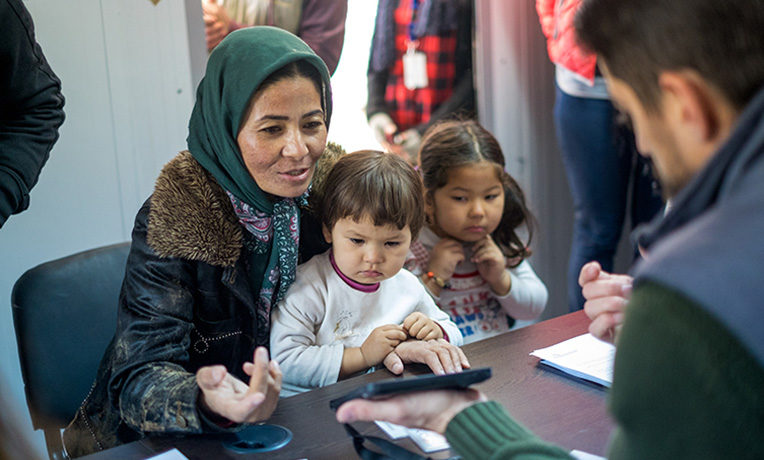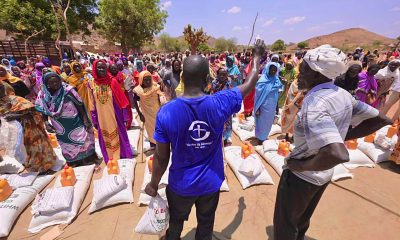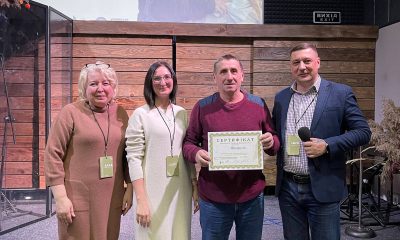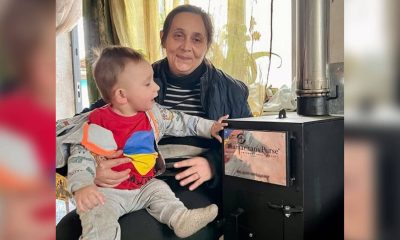A refugee family thanks Samaritan's Purse for providing for their basic needs.
Arman, his wife, and four children live in an abandoned Greek naval academy that has been transformed into a government-run refugee site. They are waiting on legal papers and asylum decisions, unable to do much more than sit and wait.
Arman and his family are provided breakfast at the refugee site, he’d explained to me, but only a piece of toast and coffee, and that’s not enough for an active family. The Samaritan’s Purse cash grant program has allowed him and his family to make their own dietary choices, something many of us take for granted.
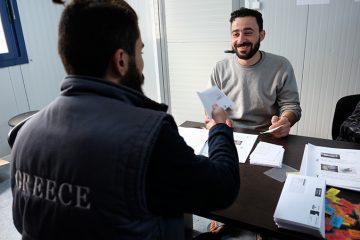
Refugee families are better able to provide for their families through the gift of cash cards.
“I made eggs this morning,” the Afghan man told me, pausing from the English lesson he was teaching to other refugees. “That is why I have energy for this,” he added. That morning Arman had used the cash card provided to his family by Samaritan’s Purse to purchase groceries, including the eggs he’d eaten for breakfast.
“Home” for the family is three bunk beds pushed together in the corner of a classroom shared with six other families. Most of the family’s belongings—including blankets, a few pots, an electric water boiler, winter coats, soccer shoes for the active boys, and a few red and pink backpacks—have all been given to them by humanitarian organizations.
“It’s very humbling,” Arman said. “In Afghanistan, I could provide for my family. Here I am like a beggar.”
Samaritan’s Purse is helping to restore dignity to families like Arman’s who have fled to Greece.
Dignity in Decision
Last fall, Samaritan’s Purse began a cash grant program in Athens which has now expanded to include similar programs on the islands of Chios and Samos.
Refugees who qualify for the programs are provided grants in the form of pre-paid cash cards, like debit cards, that are topped up each month. The amount each person receives is not a large sum, but goes a long way in helping individuals and families pay for things such as food, medicine, and data for their phones so they can communicate with family back home. The program aims to promote dignity, resilience, and integration into the local Greek community. It brings back a small sense of normality.

Families use cash cards to buy food, clothing, and other necessities.
How each person uses the money is up to them. The freedom of making their own decisions is important to these families. “We like getting to choose the color of the things we buy,” Arman said. “If we want blue, we buy blue. If we want red, we buy red.”
The family has used their money to buy medicine and food, and to creatively invest in their children’s education. A couple weeks ago they were also able to buy a birthday cake for their middle son’s 13th birthday. Creating a normal life for their family has not been easy, but Arman and his wife are doing their best.
Restoring Dreams
“We have been in Greece 382 days,” Arman told me recently. “In all that time, my children have been in school only one day.”
With the money they’ve received through the cash program, the family purchased smartphones for their older children so they can download learning apps. All the children have been learning English and German on their phones.

We administer cash cards through an electronic database and registration process.
“Introduce yourselves in English,” Arman told his children the first day we met. The oldest, a funny but polite 15-year-old son who loves playing soccer in the cement yard of the naval academy, responded first. “My name is Mullah, I am from Afghanistan, and I want to go to MIT to study computer science.”
The second son told me he also loves soccer and wants to be a biomedical scientist. “I want to help discover new medicine that can cure diseases,” he told me in English. The youngest, a girl, piped up and her brothers translated for me: “She wants to be a dentist.” She smiled shyly.
Arman’s wife, Tamana, is also proud of her children and encourages them to keep learning and dreaming—something that is not always easy to do when you are a refugee stuck waiting for asylum decisions.
Tamana, though, stays positive and hopeful. I love watching her care for her family, especially with her love of cooking. Now that her family receives money on their cash card from Samaritan’s Purse, she cooks meals that her family loves and also invites neighbors and guests over for tea and snacks.
On my first visit with the family, Tamana poured tea from her electric kettle into a Styrofoam cup and held it out to me. “Next time we’ll serve you tea in a real mug,” Arman said. “In Afghanistan, we like to treat our guests the very best we can.”
The next time I visited the family, I drank tea from a real mug and marveled at the progress the children had made in English and German. It’s amazing how something as simple as a cash program can have such great impact in restoring dignity and keeping hope alive.
“They have big dreams,” Arman told me proudly. “And thanks to your cash cards, my family is able to keep learning!”

Offering tea to guests in a “real mug” is a simple hospitality cherished by refugee families.

